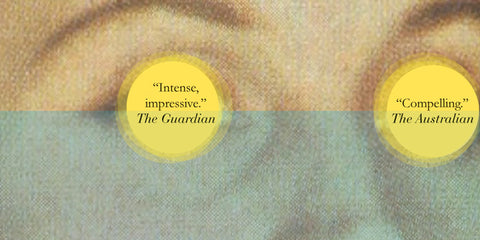An Interview with Melanie Finn

In September we will be publishing the second novel by Melanie Finn, The Gloaming, which was published as "Shame" in the UK, where it was called "intense" and "impressive" by The Guardian, as well as being named to the paper's 'Not the Booker Prize' shortlist.
When I received the manuscript to consider, there was a note of endorsement from the UK editor claiming that "Finn can do guilt and atonement as well as McEwan, landscape as well as Coetzee, and the nuance of the female psyche as well as Shreve." A bold statement, to be sure, and one I now hold to be true.
 The Gloaming follows Pilgrim Jones, whose husband left her for another woman, stranding her in a small Swiss town where she is involved in a tragic car accident that leaves 3 school-children dead. Cleared of responsibility though overcome with guilt, she alights for Africa, where she befriends a series of locals each with their own tragic past, each isolated in their own private way in the remote Tanzanian outpost. Mysteriously, the remains of an albino African appear packaged in a box, spooking everyone—sign of a curse placed by a witch doctor—though its intended recipient is uncertain. Pilgrim volunteers to rid the town of the box and its contents, though wherever she goes, she can't shake the feeling that she's being followed. The Gloaming is a thrilling, haunting new work of guilt, atonement, and finally, hope.
The Gloaming follows Pilgrim Jones, whose husband left her for another woman, stranding her in a small Swiss town where she is involved in a tragic car accident that leaves 3 school-children dead. Cleared of responsibility though overcome with guilt, she alights for Africa, where she befriends a series of locals each with their own tragic past, each isolated in their own private way in the remote Tanzanian outpost. Mysteriously, the remains of an albino African appear packaged in a box, spooking everyone—sign of a curse placed by a witch doctor—though its intended recipient is uncertain. Pilgrim volunteers to rid the town of the box and its contents, though wherever she goes, she can't shake the feeling that she's being followed. The Gloaming is a thrilling, haunting new work of guilt, atonement, and finally, hope.
Following is an interview with Finn about The Gloaming.
=====
Q: Without giving too much away, can you tell us about the true story that served as inspiration for the book?
A: In 2002, just outside Zurich, Switzerland, a DHL cargo plane collided with a Russian airliner carrying mostly school children and their parents. Nearly 200 people were killed. An investigation concluded that it was human error—the fault of the air traffic controllers at Zurich airport. No one was prosecuted. A Russian man—he’d lost his son and wife in the crash—tracked down the controller who’d been on duty that night and stabbed him to death. I found the story so compelling—that really shameful mawkishness I think most writers have about human falling. The father’s actions were completely understandable: the law had failed him, and in his anger and grief he did what most parents would certainly consider doing. As for the air traffic controller, I assumed he must have been devastated—really haunted by what he’d been a part of, had caused, simply by going to work that day. The law had failed him, too, because he had no way to atone, no way to account for his guilt. He was just left with this enormous burden of shame and guilt.
In the UK, The Gloaming was published as Shame, which is apt as well. Another appropriate title could be Guilt. How did you seek to explore that emotion through this story?
The working title was actually “Though The Light Seems Small” because, to me, the book is ultimately about hope. In the midst of the most awful tragedy, we’re made myopic by grief and horror; but the truth is sometimes wonderful things come about because of that tragedy. I’m not saying there’s any mitigation of real sorrow or loss, but life arranges itself again, and sometimes this shift allows for unexpected joy and goodness. I loved the title “Shame” because it’s powerful and emotive and it speaks to the obscuring power of that emotion. At the same time, I almost wished the publisher had put the word “Hope” on the back cover, because that’s where the book heads. So “The Gloaming” appealed to me because it’s about that moment between light and dark, both are there in balance.
You spent the first 11 years of your life in Kenya. How did growing up there shape your worldview?
 It was an utterly free childhood—I was a free range kid, often alone, but this allowed me to be fully engaged with my environment. I loved walking (still do!) and I’d roam the beaches and tidal pools along the Indian Ocean coast where we went for holidays, or the quiet neighborhood in Nairobi where we lived. When you’re alone, you see stuff, you talk to people—strangers, neighbors, tinkers—you’re able to be utterly involved in the moment. I was probably much too young to be so unsupervised, but I’m glad for it. Self-sufficiency is very empowering!
It was an utterly free childhood—I was a free range kid, often alone, but this allowed me to be fully engaged with my environment. I loved walking (still do!) and I’d roam the beaches and tidal pools along the Indian Ocean coast where we went for holidays, or the quiet neighborhood in Nairobi where we lived. When you’re alone, you see stuff, you talk to people—strangers, neighbors, tinkers—you’re able to be utterly involved in the moment. I was probably much too young to be so unsupervised, but I’m glad for it. Self-sufficiency is very empowering!
You and your husband (the filmmaker, Matt Aeberhard) co-wrote and directed the Disney Nature documentary, The Crimson Wing. While working on that project in Tanzania, you served as the medic to the local Masai population. I imagine that to be a transformative experience. What did you take away from it and did it influence this story?
We were living on the edge of Lake Natron, which is one of the remotest areas in Tanzania—four hours of rough driving to the nearest road. It was an extraordinary place—wild, beautiful, isolated. And the local people—Masai—were tough, resilient, and self-reliant. Even when we were living there, Matt and I were both able to appreciate that our experience was life-defining. I started treating people because they heard I had some medicine, and they were desperate. While I was amazed by the miracle of antibiotics and how I could “cure” people with basic treatment or get them to hospital, I was horrified that I had this power. Because I had a vehicle, communication, basic medical knowledge and a first aid box, I was saving the lives of little babies. And their mothers were unable to do so because they didn’t have my resources. It was immoral for me to have that power—especially since I could withdraw that power by leaving. So, in our final year at Natron, I worked with Matt’s mom—Penny, a respected GP in the UK—to set up the Natron Healthcare Project. We bring sustainable healthcare to the two communities we lived and worked among: regular medical outreach, annual eye clinics, but also education about health issues like pre-natal care, immunizations, hygiene, dehydration and sexually transmitted disease. When people understand their health issues, then they’re better able to make good, pro-active decisions for prevention and treatment. It’s a small project, but we’re seeing positive change in how the communities approach their healthcare, and that’s huge.
I love the mystery of The Gloaming, and there are a number of them at work. When Pilgrim arrives in Magulu—which is a quiet, eerie outpost in Tanzania, kind of like the wild west, with unique survivors all with their own story of struggle—a couple of mysterious events take place. First, a mercenary whose truck may or may not be broken down arrives in town, followed shortly thereafter by a box containing the remains of an albino African. The murdered albino spooks everyone, even the doctor and police, as it's used as a curse by the local witch doctors. To everyone's relief, Pilgrim offers to get rid of the package. When I started your book, the elements of mystery were not ones that I expected to encounter, and I found them to be absolutely captivating. How did you end up incorporating these elements into the story?
Spending time in East Africa—both as a child and throughout my adult life as a journalist and writer, I’ve been sensitive to the idea of the spirit world, the belief that spirits—shetani—live among us, as real as anything living or tangible. I cannot say I believe, but I do think we underestimate the plasticity of reality. Pilgrim is a very literal person, a self-confessed atheist, and part of her psychological disintegration is to become privy to that spirit world—to enter it. Witchdoctors are powerful not because they are magic, but they have insight—they understand the power of suggestion, the power of intention. I’ve encountered witchdoctors who are basically village shrinks, they can really help people heal through ritual and placebo. They can also do a lot of damage to those who are vulnerable and supersititious. But we have that here, too: preachers who want to create tolerance, acceptance, love—and those who prey on our darker, more divisive instincts.
=====
You can pre-order The Gloaming for 25% off here.
If you are a bookseller, librarian, or critic interested in receiving an ARC of the novel, click here.


Comments